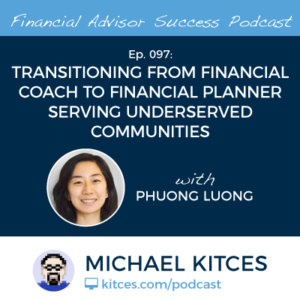 Welcome back to the 97th episode of the Financial Advisor Success podcast!
Welcome back to the 97th episode of the Financial Advisor Success podcast!
This week's guest is Phuong Luong. Phuong is the founder of Just Wealth, an independent RIA specifically focused on working with younger clients in their 20s, 30s, and 40s who are still in the wealth building phase of their careers, and with whom Phuong meets entirely virtually using video conferencing tools, even though most of her clients are actually in the Boston area where she's located as well.
What's unique about Phuong, though, is not just her virtual practice, but that she comes from a background of doing financial coaching and counseling, and as a result, more than half her practice is working with clients who are below the median household income in Massachusetts, about $75,000 a year, for whom she charges an ongoing monthly retainer fee of 1.5% of their monthly income.
In this episode, we talk in depth about what it's like doing financial planning for lower and middle-income families. Why they really are willing to pay for financial planning advice despite being of limited means, how the focus typically is not actually on budgeting and household cash flow planning, but on building up their balance sheet instead, and why until those clients build up their personal balance sheet, it's necessary to understand the community balance sheet of local programs and resources to help.
We also talk about the progression from financial education to financial coaching to financial counseling to financial planning. The differences in each of those terms, not just in regards to the income or affluence of the clients being served, but the mindset of the educator or coach or counselor or advisor working with the client, and the appeal for someone with a financial coaching background like Phuong to come into the financial planning world in the first place.
And be certain to listen to the end, where Phuong talks about the challenging ways that stereotypes about race and low-income individuals can become blocking points to giving them effective advice. How many of the financial challenges of working with people of color in her community can be traced back to institutional and government policies from decades ago that still have lasting effects in the compounding of income and wealth inequality, which in turn may be both limiting the reach of financial planning to minority communities, and our ability as a profession to attract people of color to become financial planners in the first place.
So whether you're interested in learning about actions you can take to help improve diversity in the financial planning profession, Phuong’s unique career journey that brought her to financial planning or how she's built a successful business helping underserved communities, then we how you enjoy this episode of the Financial Advisor Success podcast.

 Welcome back to the 96th episode of the Financial Advisor Success podcast!
Welcome back to the 96th episode of the Financial Advisor Success podcast!
